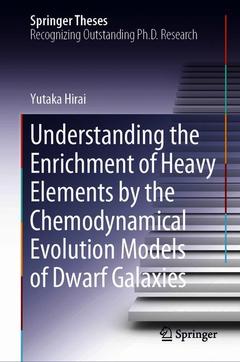Description
Understanding the Enrichment of Heavy Elements by the Chemodynamical Evolution Models of Dwarf Galaxies, 1st ed. 2019
Springer Theses Series
Author: Hirai Yutaka
Language: English
Subjects for Understanding the Enrichment of Heavy Elements by the...:
Keywords
Galactic Chemical Evolution; Numerical Simulations of Galaxy Formation; Galactic Chemical Evolution; Formation of the Milky Way Halo; Dwarf Galaxy of the Local Group; Origin of Elements in the Universe; Rapid Neutron Capture Process; Neutron Star Mergers; Electron Capture Supernovae; Heavy Element Synthesis in Galaxy; theoretical astrophysics
Approximative price 147.69 €
In Print (Delivery period: 15 days).
Add to cartSupport: Print on demand
Description
/li>Contents
/li>Biography
/li>Comment
/li>
This book addresses the mechanism of enrichment of heavy elements in galaxies, a long standing problem in astronomy. It mainly focuses on explaining the origin of heavy elements by performing state-of-the-art, high-resolution hydrodynamic simulations of dwarf galaxies. In this book, the author successfully develops a model of galactic chemodynamical evolution by means of which the neutron star mergers can be used to explain the observed abundance pattern of the heavy elements synthesized by the rapid neutron capture process, such as europium, gold, and uranium in the Local Group dwarf galaxies. The book argues that heavy elements are significant indicators of the evolutionary history of the early galaxies, and presents theoretical findings that open new avenues to understanding the formation and evolution of galaxies based on the abundance of heavy elements in metal-poor stars.
Introduction.- Enrichment of r-Process Elements in Dwarf Spheroidal Galaxies in the Chemodynamical Evolution Models.- Early Chemodynamical Evolution of Dwarf Galaxies Deduced from r-Process Elements.- Enrichment of Zinc in Dwarf Galaxies.- Efficiency of Metal Mixing in Dwarf Galaxies.- Enrichment of r-Process Elements in a Cosmological Context.- Conclusions and Future Prospects.
Yutaka Hirai is a special postdoctoral researcher (SPDR) at the RIKEN Center for Computational Science. He has participated in studies of galactic chemical and dynamical evolution using high-resolution hydrodynamic simulations. His research has mainly focused on enrichment of heavy elements from neutron star mergers and supernovae in Local Group galaxies. He received his B.Sc. in Physics from Waseda University in 2013, M.Sc. in Astronomy in 2015, and Ph.D. in Astronomy in 2018 from the University of Tokyo. He was awarded a Research Fellow by Japan Society for the Promotion of Science (JSPS) from April 2015 to March 2018.
Nominated as an outstanding Ph.D thesis by the Department of Astronomy at the University of Tokyo
Includes a wealth of color figures to help readers understand ancient times in the Universe based on present observations
Provides methods for simulating galaxy formation and nucleosynthesis yields
Reviews recent advances in nucleosynthesis and galactic chemical evolution
These books may interest you

Physics of the Plasma Universe 189.89 €



